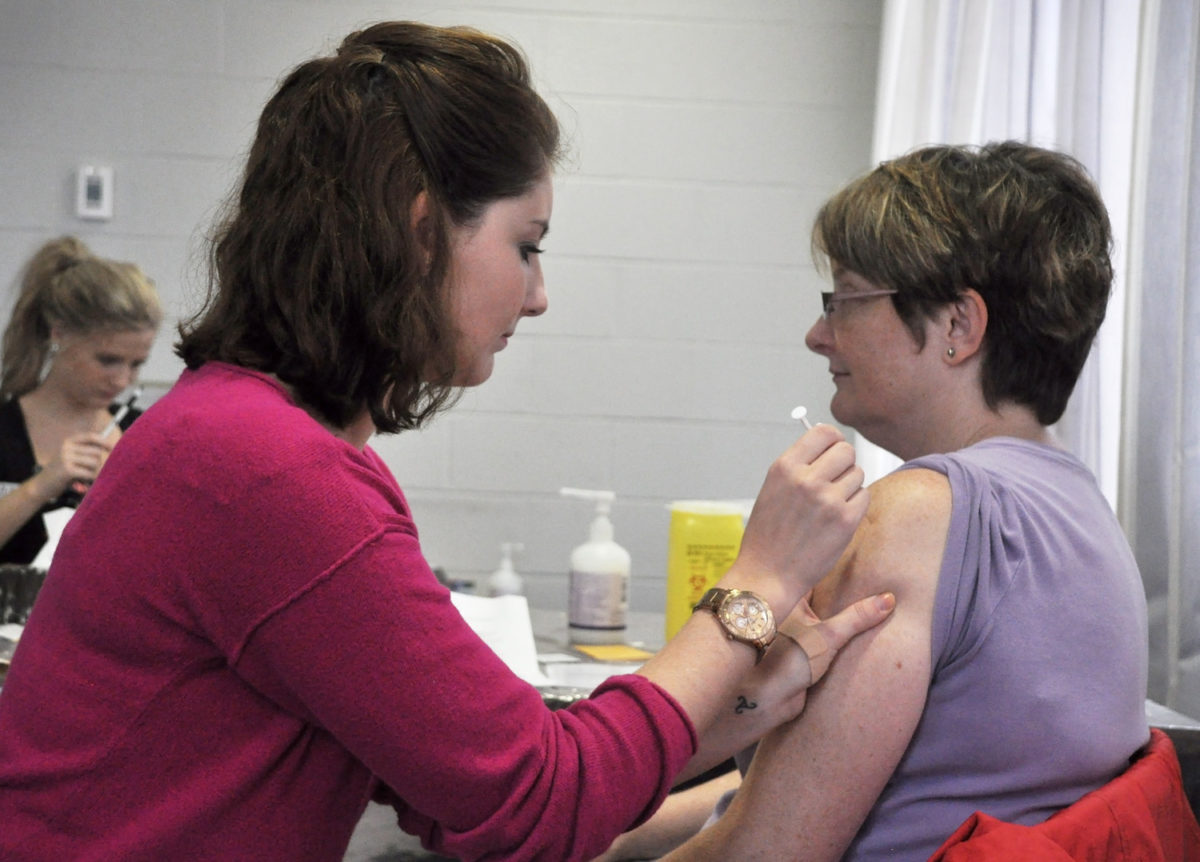

A flu shot clinic will be coming to the J.B O’Keefe Fitness Centre on Nov. 6, but not everyone thinks it’s worth it.
“Flu shots aren’t going to prevent the flu,” said Shirley Wells, a retired nurse from Oromocto. “I’ve always had the belief that by the time we get the flu shot, there’s another strain that’s coming out anyway.”
Flu shots are mandatory for health-care professionals at Horizon Health Network, which oversees hospitals in English New Brunswick. However, according to Statistics Canada, in 2008 only about a third of Canadians over the age of 12 reported getting the shot.
Some, like third-year UNB nursing student Max LeBlanc, feel the vaccine helps. He’s one of the third-year nursing students administering shots on campus as part of the UNB nursing curriculum.
Although the Horizon Health Network policy allows him to opt out of the flu shot and wear a mask, he got the shot anyway. LeBlanc says his immune system isn’t as strong as most.
He says more times than not, the vaccines are effective. What sounds like guesswork to most in combating the flu is actually educated guesswork.
“They do a mixture, I think of about three strains to maximize the chance that they’re going to catch the one that will be in our area,” he said. “The vaccine has been more than half right every time.”
Brad Brewer is a third-year economics student at STU.
“I would never trust science,” he says. “I would have to see the statistics on it, if it’s effective. Is it?”
According to the Centre for Disease Control, flu shots are effective approximately 60 per cent of the time when matched well with the strain. They are most effective in children over 12 and healthy adults.
Still, Brewer won’t be getting a flu shot because he doesn’t get sick very often, “maybe once every four years.”
According to the Centers for Diseases Control and Prevention, vaccines don’t work the same for everyone. Factors like age, health and fitness make a difference. Also, its effectiveness relies on how well it matches the strain.
Wells thinks there is a lot of guesswork involved in combating flu strains.
“It’s mutating all the time. You can’t really say that what you get vaccinated against now is going to be effective,” she said.
Brewer said he’s heard the shots can make you sicker, but LeBlanc says that’s simply not true. It’s a myth. The shot injects a dead virus into the body. You can’t get sick from the vaccine, he said.
“It’s ruled out.”
If people get sick after the vaccine, they probably caught it right before, said LeBlanc, noting the vaccine has roughly a two-week incubation time. Some minor post-vaccine symptoms are soreness. A small number of people get tired or develop a fever. Some mistake this for the flu.
Andrew Solano is a first-year STU student who got a flu shot during H1N1 outbreak, but not since. He’s also a skeptic.
“You don’t know what’s going to happen down the road, if there’s any long-term side effects to the vaccine,” he said.
But there are other reasons for getting to flu shot, like protecting others around you that don’t have as strong immune systems.
Despite her skepticism, Wells gets a shot now because she has a grandson who was premature. She doesn’t want to bring it home with her, something she and LeBlanc agree on.
“If you ever go visit your grandparents, they’re part of an at-risk population where they’re not going to be as physically able to fight off the flu,” LeBlanc said. “Same thing if you’re dealing with young children … Do it for everybody else.”
The flu shot costs $15 for students and $25 for faculty and staff.
“It’s a tough decision and it is a personal one. A lot of it does come down to how well you feel you can fight these off.”
